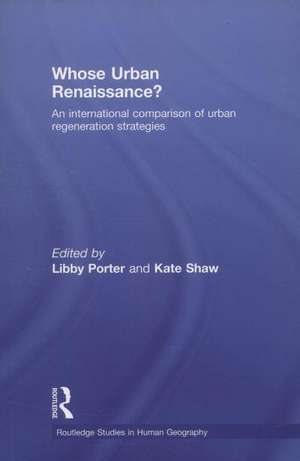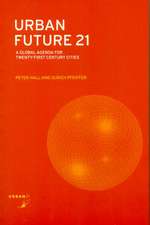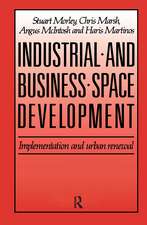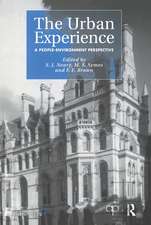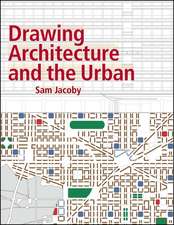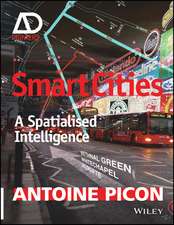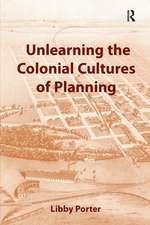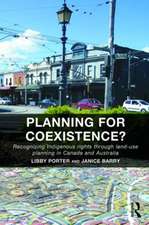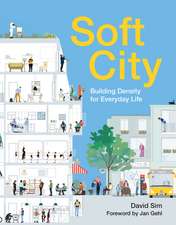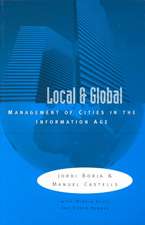Whose Urban Renaissance?: An international comparison of urban regeneration strategies: Routledge Studies in Human Geography
Editat de Libby Porter, Kate Shawen Limba Engleză Paperback – 9 sep 2013
Whose Urban Renaissance? asks who benefits from these urban transformations. The book contains beautifully written and accessible stories from researchers and activists in 21 cities across Europe, North and South America, Asia, South Africa, the Middle East and Australia, each exploring a specific case of urban regeneration. Some chapters focus on government or market strategies driving the regeneration process, and look closely at the effects. Others look at the local contingencies that influence the way these strategies work. Still others look at instances of opposition and struggle, and at policy interventions that were used in some places to ameliorate the inequities of gentrification. Working from these stories, the editors develop a comparative analysis of regeneration strategies, with nuanced assessments of local constraints and counteracting policy responses. The concluding chapters provide a critical comparison of existing strategies, and open new directions for more equitable policy approaches in the future.
Whose Urban Renaissance? is targeted at students, academics, planners, policy-makers and activists. The book is unique in its geographical breadth and its constructive policy emphasis, offering a succinct, critical and timely exploration of urban regeneration strategies throughout the world.
| Toate formatele și edițiile | Preț | Express |
|---|---|---|
| Paperback (1) | 338.81 lei 6-8 săpt. | |
| Taylor & Francis – 9 sep 2013 | 338.81 lei 6-8 săpt. | |
| Hardback (1) | 854.69 lei 6-8 săpt. | |
| Taylor & Francis – 15 dec 2008 | 854.69 lei 6-8 săpt. |
Din seria Routledge Studies in Human Geography
-
 Preț: 332.18 lei
Preț: 332.18 lei -
 Preț: 371.71 lei
Preț: 371.71 lei -
 Preț: 334.09 lei
Preț: 334.09 lei -
 Preț: 341.08 lei
Preț: 341.08 lei - 18%
 Preț: 1057.75 lei
Preț: 1057.75 lei - 18%
 Preț: 1072.71 lei
Preț: 1072.71 lei - 12%
 Preț: 299.87 lei
Preț: 299.87 lei -
 Preț: 490.62 lei
Preț: 490.62 lei - 25%
 Preț: 823.63 lei
Preț: 823.63 lei - 18%
 Preț: 1058.79 lei
Preț: 1058.79 lei - 18%
 Preț: 1054.71 lei
Preț: 1054.71 lei - 13%
 Preț: 296.11 lei
Preț: 296.11 lei - 18%
 Preț: 1057.89 lei
Preț: 1057.89 lei - 25%
 Preț: 825.62 lei
Preț: 825.62 lei - 18%
 Preț: 732.06 lei
Preț: 732.06 lei -
 Preț: 414.32 lei
Preț: 414.32 lei - 18%
 Preț: 1062.98 lei
Preț: 1062.98 lei - 18%
 Preț: 702.31 lei
Preț: 702.31 lei - 18%
 Preț: 1057.09 lei
Preț: 1057.09 lei - 18%
 Preț: 1169.66 lei
Preț: 1169.66 lei - 18%
 Preț: 1114.98 lei
Preț: 1114.98 lei -
 Preț: 408.54 lei
Preț: 408.54 lei -
 Preț: 419.50 lei
Preț: 419.50 lei - 28%
 Preț: 823.08 lei
Preț: 823.08 lei -
 Preț: 373.59 lei
Preț: 373.59 lei - 5%
 Preț: 353.14 lei
Preț: 353.14 lei - 18%
 Preț: 1055.06 lei
Preț: 1055.06 lei - 18%
 Preț: 1058.69 lei
Preț: 1058.69 lei - 18%
 Preț: 1065.06 lei
Preț: 1065.06 lei - 18%
 Preț: 1060.87 lei
Preț: 1060.87 lei - 18%
 Preț: 1069.92 lei
Preț: 1069.92 lei -
 Preț: 418.65 lei
Preț: 418.65 lei -
 Preț: 446.58 lei
Preț: 446.58 lei -
 Preț: 408.74 lei
Preț: 408.74 lei -
 Preț: 423.30 lei
Preț: 423.30 lei - 18%
 Preț: 1055.51 lei
Preț: 1055.51 lei - 28%
 Preț: 878.82 lei
Preț: 878.82 lei - 18%
 Preț: 1061.57 lei
Preț: 1061.57 lei - 28%
 Preț: 849.84 lei
Preț: 849.84 lei - 18%
 Preț: 733.11 lei
Preț: 733.11 lei - 25%
 Preț: 855.05 lei
Preț: 855.05 lei - 26%
 Preț: 764.20 lei
Preț: 764.20 lei
Preț: 338.81 lei
Preț vechi: 387.02 lei
-12% Nou
Puncte Express: 508
Preț estimativ în valută:
64.83€ • 67.69$ • 53.66£
64.83€ • 67.69$ • 53.66£
Carte tipărită la comandă
Livrare economică 05-19 aprilie
Preluare comenzi: 021 569.72.76
Specificații
ISBN-13: 9780415860710
ISBN-10: 0415860717
Pagini: 320
Ilustrații: 56 black & white illustrations, 3 black & white tables, 38 black & white halftones, 18 black & white line drawings
Dimensiuni: 156 x 234 x 20 mm
Greutate: 0.48 kg
Ediția:1
Editura: Taylor & Francis
Colecția Routledge
Seria Routledge Studies in Human Geography
Locul publicării:Oxford, United Kingdom
ISBN-10: 0415860717
Pagini: 320
Ilustrații: 56 black & white illustrations, 3 black & white tables, 38 black & white halftones, 18 black & white line drawings
Dimensiuni: 156 x 234 x 20 mm
Greutate: 0.48 kg
Ediția:1
Editura: Taylor & Francis
Colecția Routledge
Seria Routledge Studies in Human Geography
Locul publicării:Oxford, United Kingdom
Cuprins
1. Introduction (Libby Porter and Kate Shaw) Part 1: On Urban Renaissance Strategies Case Study: Top Down Vs. Bottom Up: Doreen From Silwood, a Social Housing Estate in South London (Mark Saunders) 2. Class-cleansing in Istanbul’s World-city Project (Ibrahim Gündogdu and Jamie Gough) 3. Believing in Market Forces in Johannesburg (Tanja Winkler) 4. Regeneration through Urban Mega-projects in Riyadh (Tahar Ledraa and Nasser Abu-Anzeh) 5. Regulation and Property Speculation in the Centre of Mexico City (Beatriz García-Peralta and Melanie Lombard) 6. Museumization and Transformation in Florence (Laura Colini, Anna Lisa Pecoriello, Lorenzo Tripodi and Iacopo Zetti) 7. Winners and Losers from Urban Growth in South East England (Bob Colenutt) Part 2: On Local Limits to Regeneration Strategies Case Study: When Fish Sing in Brussels (Ruth Pringle) 8. Renaissance through Demolition in Leipzig (Matthias Bernt) 9. Image Politics and Stagnation in the Ruhr Valley (Sebastian Müller and Constance Carr) 10. Gentrification and the Creative Class in Berlin-Kreuzberg (Ingo Bader and Martin Bialluch) Part 3: On Grass-roots Struggles Case Study: Gathering Memories at the Battlefront: www.oldbeijing.org (Yi Jing, Giovanni Allegretti and James McKay) 11. The Contested Reinvention of Inner City Green Bay, Wisconsin (Marcelo Cruz) 12. Planning From Below in Barcelona (Marc Martí-Costa and Jordi Bonet-Martí) 13. The Ambiguous Renaissance of Rome (Giovanni Allegretti and Carlo Cellamare) 14. Struggling Against Renaissance in Birmingham’s Eastside (Libby Porter) 15. Urban Renaissance and Resistance in Toronto (Ute Lehrer) 16. Gentrification and Community Empowerment in East London (Claire Colomb) Part 4: On the Possibilities of Policy Case Study: Gertrude Street Fitzroy (Rodger Cummins and Kate Shaw) 17. Heritage Tourism and Displacement in Salvador da Bahia (Elena Tarsi) 18. Retail Gentrification in Ciutat Vella, Barcelona (Núria Pascual-Molinas and Ramon Ribera-Fumaz) 19. The Melbourne Indie Music Scene and the Inner City Blues (Kate Shaw) 20. The Embrace of Amsterdam’s Creative Breeding Ground (Bas van de Geyn and Jaap Draaisma) 21. The Equitable Regeneration of Berne (Angela Stienen and Daniel Blumer) 22. Searching for the ‘sweet spot’ in San Francisco (Peter Cohen and Fernando Martí) Case Study: Bottom Up Vs. Top Down: Jess From Pepys, a Social Housing Estate in South London (Mark Saunders) Part 5: New Theoretical and Practical Insights for Urban Policy 23. Whose Urban Renaissance? (Libby Porter) 24. Rising to a Challenge (Kate Shaw)
Notă biografică
Kate Shaw has a background in alternative cultures and activism. She is a Research Fellow at the University of Melbourne and works on cultural diversity, gentrification, housing markets and urban policy and planning. She is a well-known media commentator and gives policy advice to various Melbourne councils and local campaigns.
Libby Porter is Lecturer in Planning in the Department of Urban Studies at the University of Glasgow. She has an interest in the way in which planning conceptualises place and the implications of this for marginalised peoples and places, with particular application to planning in postcolonial societies.
Libby Porter is Lecturer in Planning in the Department of Urban Studies at the University of Glasgow. She has an interest in the way in which planning conceptualises place and the implications of this for marginalised peoples and places, with particular application to planning in postcolonial societies.
Recenzii
‘Appropriately critical, this wide-ranging and well balanced collection moves beyond the simplistic caricatures of urban regeneration as all good or all bad that have dominated the literature for so long. In so doing it keeps open the possibilities of urban regeneration for creating a socially just city’ - LORETTA LEES, King’s College London
"This is an exciting and thought-provoking collection. It combines a critical review of the international practice of urban renaissance and urban regeneration, with a profound and sympathetic understanding of local experience. It's exciting because it brings together evidence and ideas from across the world and though-provoking because it points to a range of alternative futures. It is explicitly focused on the ways in which contemporary urban policy helps to generate inequality, but also looks for ways in which dominant approaches can be challenged. The stories told in its case studies are stories of possibility as well as stories of top-down neo-liberalism. Instead of presenting policy as something that is simply handed down to a passive population, these stories offer the prospect of a world in which active engagement can generate positive outcomes. This is a book that should be read by planners and policy-makers, academics and activists, students and teachers. It undermines old certainties and encourages new ways of thinking about old problems" - ALLAN COCHRANE, Open University
‘This is an extraordinary and much-needed collection. Porter and Shaw have assembled a truly international cast of critical urban scholars, and their editorial skills have resulted in a book that will surely become the definitive resource for anyone interested not just in the dark side of urban regeneration, but - more importantly - what might be done about it. Any quick skim of the book will be arrested by essays that are truly riveting. The courage, the honesty, and the genuine optimism of the contributors that there can be something other than gentrification will create and enliven debates for years to come’ - TOM SLATER, University of Edinburgh
"This is an exciting and thought-provoking collection. It combines a critical review of the international practice of urban renaissance and urban regeneration, with a profound and sympathetic understanding of local experience. It's exciting because it brings together evidence and ideas from across the world and though-provoking because it points to a range of alternative futures. It is explicitly focused on the ways in which contemporary urban policy helps to generate inequality, but also looks for ways in which dominant approaches can be challenged. The stories told in its case studies are stories of possibility as well as stories of top-down neo-liberalism. Instead of presenting policy as something that is simply handed down to a passive population, these stories offer the prospect of a world in which active engagement can generate positive outcomes. This is a book that should be read by planners and policy-makers, academics and activists, students and teachers. It undermines old certainties and encourages new ways of thinking about old problems" - ALLAN COCHRANE, Open University
‘This is an extraordinary and much-needed collection. Porter and Shaw have assembled a truly international cast of critical urban scholars, and their editorial skills have resulted in a book that will surely become the definitive resource for anyone interested not just in the dark side of urban regeneration, but - more importantly - what might be done about it. Any quick skim of the book will be arrested by essays that are truly riveting. The courage, the honesty, and the genuine optimism of the contributors that there can be something other than gentrification will create and enliven debates for years to come’ - TOM SLATER, University of Edinburgh
Descriere
The desire of city governments for a ‘renaissance’ of their inner-cities has become a defining feature of contemporary urban policy. From Berlin and Toronto to Johannesburg and Beijing, government policies are succeeding in attracting investment and middle-class populations (back) to their inner areas. Cities undergoing regeneration—or gentrification as this process can often become—produce winners and losers. There is now a substantial literature on the inequitable effects of rent increases and displacement, for example, and even more on the global and local contexts for urban regeneration and the reasons governments encourage it. But there is very little exploration of the policies used to drive regeneration.
